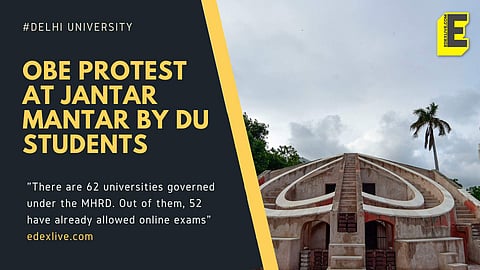

The Delhi University students’ protest at Jantar Mantar continued for almost eight hours yesterday, April 12. The students, after having organised seven to eight protests earlier, had been forced by the authorities to take the protest for OBE (open book examinations) outside the campus this time, with the implementation of Section 144 in the university.
The protest had started at eleven in the morning. Himani Singh, a student of the university, says that by five o’clock, the crowd had thinned down to 50-60 students. However, she says that they (the students) are not disappointed. “Ankurji (Ankur Dhama, State President of Indian National Students Organization or INSO) has submitted a memorandum to the MHRD (Ministry of Human Resource Development, now known as the Ministry of Education or MoE),” she said. The students are determined not to leave any stone unturned in their demand for OBE.
“There are 62 universities governed under the MHRD. Out of them, 52 have already allowed online exams. Mumbai University, IIT, Allahabad University (AU) and Banaras Hindu University (BHU) are some of them,” the student details. “Since so many universities have accepted online exams, we are positive too,” she says. The memorandum by Ankur Dhama and student activist Pawan Badhana has been submitted to Vineet Joshi, MHRD Secretary, who will mostly be taking a decision about the memorandum. MHRD has told the students that they will review the memorandum and revert back to the students on Monday, April 18. Till then, the students have decided to sit it out and watch.
“There are no more protests planned as of now,” Himani said. “Everyone is hopeful and waiting for some positive news. We also have exams and assignments to focus on. There is almost no time left for the preparations,” she adds. She also says that if not OBE, students will also be satisfied with a hybrid mode of exams. The students say that the DU Board simply needs to understand their concerns and address them suitably.
The DU students had planned this as a massive protest and had even taken to campaigning so that more and more students can join them on social media. However, only a few hundred students actually turned up at Jantar Mantar, the selected site for the protest. “There was a problem in reaching out to everyone,” says Himani Sigh, a student of the university. “Exams are also coming up, and we have very little time left with us to prepare. We have also been piled with assignments and we are being reminded about submission dates by the professors constantly. Due to this as well, many students who knew about the protest also couldn’t make it,” she adds.
The demand has various reasons behind it. The students are worried about the high prices of accommodations that they will need to rent for writing the exams offline, as hostels are not available to all. There are also VISA issues for foreign students. Most importantly, the students are worried about their marks. Since they have studied a large portion of their syllabus online, writing the exams offline will be highly taxing, they state.
After the initial protests, the DU Board had made some adjustments to its examinations. It has allowed an additional time of 30 minutes for the students to write the exams and has offered to conduct extra classes to make up for the loss that occurred in the teaching-learning process due to COVID-19. The students, however, are unsatisfied and far from convinced to stop asking for online exams.
They also say that notice for offline exams was also recently given and there is very little time left for them to prepare for the exams, a situation in which additional time and extra classes will be “useless”. Another concern they have is that the students of other universities who will be appearing exams online will score a good percentage, whereas, they will be prone to scoring fewer marks because of offline exams. “This is a kind of discrimination, and will hamper our chances of getting hired for jobs after college,” Himani voices out.
